He was a young and little-known underdog. So Max Baucus, candidate for Congress, decided to trek 630 miles across Montana and listen to people talk about their problems. “As luck would have it, on the first day, I walked into a blizzard,” he recalls, pointing to a photo of his young self caked in snow. “It was cold! But the blizzard didn’t last that long.”
Baucus shed 12lbs during that two and a half month journey in 1974. He also made friends. The Democrat defeated a Republican incumbent and would soon go on to serve as a Montana senator for 36 years. He never lost an election but saw his beloved home state undergo many changes. Among them is the prospect that Democrats like him are now facing political extinction.
Jon Tester, a moderate Democrat who is one of Montana’s current senators, is fighting for his political life in the 5 November election. Opinion polls suggest that he is trailing his Republican rival Tim Sheehy. Control of the closely divided Senate, and the ability to enable or stymie the ambitions of a President Kamala Harris or President Donald Trump, could hinge on the outcome.
The Senate race in Montana is widely seen as a litmus test of whether Democrats can still win in largely rural states that have embraced Trump’s Republican party. It is also a study in whether the type of hyperlocal campaigning that Baucus practised half a century ago can outpace shifts in demographics, media and spending that have rendered all politics national.
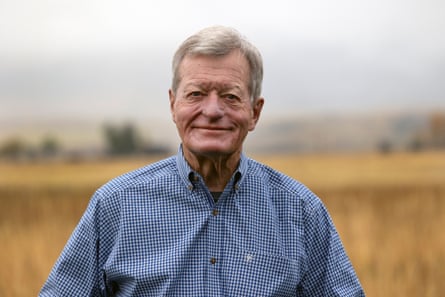
“Montana was not yet discovered,” recalled Baucus, 82, sitting near old campaign posters – “Democrat Max Baucus walks for Congress” – in the brick-and-wood institute that bears his name on Bozeman’s idyllic main street. “There was much more retail politics, knocking on doors, shaking hands, going all around the community, knowing people personally. There’s a saying that Montana is one big small town and that was very true back then. It’s not quite as true today.”
Tester, 68, a likable, unpretentious dirt farmer who is Montana through and through, epitomises the old retail politics. His campaign ads emphasise his rural background, including three fingers missing on his left hand — lost to a meat grinder that he still owns. He has been in the Senate for 18 years and praised for his work on behalf of the agriculture industry, military veterans and Native American communities.
For some voters, such authenticity still resonates. Nels Johnson, 62, who works for a conservation organisation in Bozeman, said: “I’m going to vote for Jon Tester because he’s a third-generation Montanan, knows Montana values and what Montana hopes to be. His opponent is not as in touch.”
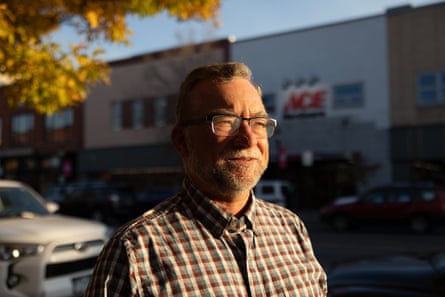
Sheehy, 37, is an outsider by comparison. The former Navy Seal moved to Montana in 2014 to raise a family and start an aerial firefighting business. He is also cast in the Trump mould: he has no previous political experience, is hostile to the media – he has given few interviews – and has been dogged by a string of controversies over exaggerated or misleading claims about his past.
Marc Racicot, 76, a former governor of Montana and ex-chairman of the Republican National Committee turned Trump critic, said: “Mr Sheehy is an acolyte of Donald Trump and so the shadow of Trump is going to influence his candidacy – what he’s willing to do and able to do and also his character and capacity to govern in a way that reflects democratic virtues and values.”
Nowhere is the contrast between the candidates more palpable than in their relationship to this year’s presidential nominees. In August, Sheehy stood alongside Trump, who won Montana overwhelmingly in the 2020 election, at a rally in Bozeman. No one is expecting Tester to hold a campaign event with Harris anytime soon. Indeed, he has declined to endorse her.
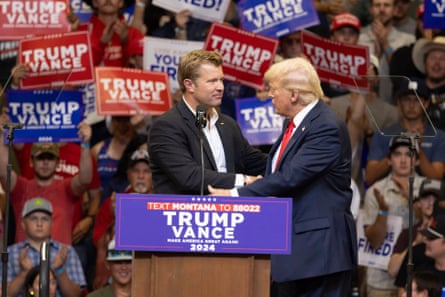
It is pragmatic calculation that recognises how Montana, which is about the size of Japan and has more cows than people, has altered since Tester came into office. The state has witnessed an influx of newcomers from Arizona, Washington state, California and Texas. During the coronavirus pandemic, Montana had the third-highest rate of growth in the country.
The state’s politics have veered to the right. When Tester entered the Senate in 2007, Democrats held almost every statewide elected office in Montana from governor, secretary of state and attorney general to two of the state’s three seats in the House of Representatives. But Republicans have steadily picked off one Democratic stronghold after another. Tester is now the last Democrat standing in statewide office.
He has survived three close races before but this looks set to be his toughest yet: he has never run before when Trump was at the top of the ballot. By distancing himself from the White House race, he is asking voters to split their ticket – something that is increasingly rare in the era of political tribalism and declining local media.

Mike Dennison, a veteran political journalist and analyst, said: “Republicans have totally tried to nationalise this race. Every chance they get, whenever they say Tester they say Biden or Harris. They want to tie him to the national Democrats and that’s absolutely what Tester does not want to do.
“The Republicans want to say this race is for control of the Senate. Tester doesn’t want to talk about that at all. He wants to talk about himself and his issues. That is what’s going on here: Democrats have had a tough time in rural America and Montana is certainly rural America.”
Republican-aligned groups are duly pumping millions of dollars into the race. Dennison added: “The amount of money in this race by Montana standards is just stunning. The prior race six years ago, when Tester ran and Trump came out to the state four times to campaign against him, was a $100m race. This is going to be a $250m race.”
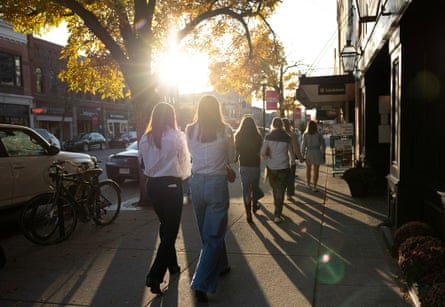
Yet for many of the voters whose screens are saturated with endless campaign ads, the number one issue is affordability. Cities such as Bozeman and Missoula have housing crises with many local people priced out.
Brian Guyer, emergency and supportive housing director at the Human Resource Development Council (HRDC), a non-profit organisation in Bozeman that runs a shelter with capacity for a hundred unhoused people, said there has been a sharp rise in individuals turning up with everything they own because of rent increases or shifts from long- to short-term rentals.
Guyer said: “They end up seeking out overnight shelter because there aren’t alternatives for them, which has turned into an odd dynamic here. We have your standard shelter guests – people who are dealing with addiction – but now we also have people who are actively participating in the Bozeman workforce but the cost of living is so expensive that the shelter is their only option in terms of places to stay. In a perverse way, this is workforce housing.”

Sheehy has, unsurprisingly, attempted to fit the problem into a national framework. Borrowing from Trump’s central campaign theme, he has argued with little evidence that immigrants are coming to the state and driving up the price of housing.
Zooey Zephyr, a progressive Democrat who is the first transgender member of the Montana state legislature, says: “We have seen from the top of the ticket of the Republican party an effort to take the issues our country is facing right now and blame it on an ‘other’. So, hey, let’s ignore the fact the state of Montana had a multibillion dollar surplus in 2023 and the legislature controlled by a Republican supermajority did not address the housing crisis adequately.
“No, instead they’re going to stoke fears that it has something to do with immigration being the main driver. We know the demographics of Montana are largely white, partially Native American, but they’re going to drum up fear about a small percentage of people in the state and try to vilify them. That’s a fear-based playbook that we’ve seen Sheehy using but it is a playbook we have seen in every election cycle.”
after newsletter promotion

In fact, many of the new arrivals are members of Sheehy’s own party, quitting liberal cities and drawn to Montana’s clear air, open spaces and good schools (the TV series Yellowstone has also boosted the state’s profile). Now nearly half of Montanas were not born in the state. They know or care little for Tester’s long service or Montana’s independent streak.
Luke Huffines, 28, a forester, moved to Montana a month ago and will vote for Sheehy – if he can register in time. “I like Sheehy’s background,” he said. “He’s Navy Seal and he’s definitely got businesses going on. He’s got private firefighting planes and whatnot and I feel like he’s getting a lot of backlash because he’s got his shit together. What’s wrong with capitalism?”
Huffines is also a supporter of Trump. He explained: “He just doesn’t give a shit. And he gets so much backlash and he just keeps moving forward.”
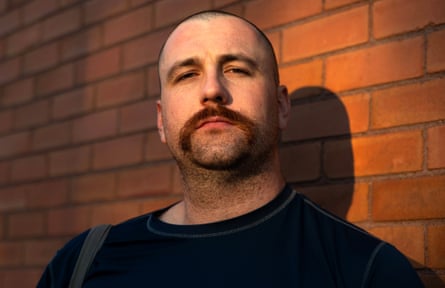
For their part, Democrats have branded Sheehy as exactly the type of rich out-of-stater who bought up multiple hones across Montana and helped drive up costs for locals. A recent report by the National Association of Realtors found that, in terms of wages versus prices, Montana now has the least affordable properties in the nation.
Shane Doyle, 52, a Native American who lives in Bozeman, describes it as a “reverse gold rush”. He said: “They’re coming here to add to what has already been a white, gated, almost resort community. The town is filled with Republicans who have come here to feel comfortable around other white people and enjoy the amenities of the outdoors and the recreation of the waters and the skiing and the hiking.
“The only place where you see minorities here in Bozeman is either on the college campus or on the outskirts of town. I’m one of the very few Indians who lives here and has managed to find a career path that allows me the money to live here.”
Montana has seven Indian reservations and almost 70,000 Native Americans, representing about 7% of its total population, according to census data. The voting bloc has long leaned Democratic but Republicans have recently courted tribal leaders hoping to gain their support. Sheehy has faced demands to apologise over past remarks he made about Native Americans being “drunk at 8am” and throwing beer cans at him on the Crow Reservation.
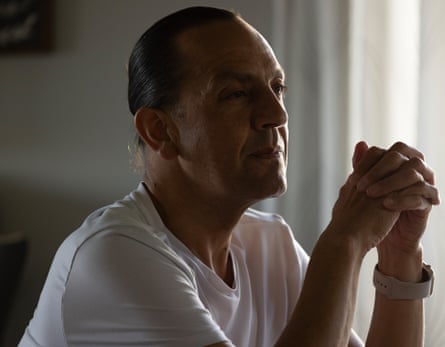
Tester has warned that Sheehy wants to sell off public lands to rich people and make Montana his own personal playground. Doyle, a member of the Crow tribe and executive director of the nonprofit group Yellowstone Peoples, regards Tester as a “staunch supporter” and believes that, if Democrats ran the state, there would be scope to bring back animals such as bison, elk, wolves and bears.
Doyle said: “Tim Sheehy says he wants to protect public lands but we’re all sceptical of that because we know he’s very interested in privatisation. There’s a lot of money to be made on Montana’s public lands and I’m afraid that, if we go full red, they’ll be more emboldened to act on their agenda. That’s going to be a bad thing for all Montanans because the crown jewel of Montana is our public lands. We have a lot to lose.”
Just as in other parts of the US, Doyle has seen the Montana Republican party lurch to the “Make America great again” (Maga) right and fan the flames of extremism. “Bozeman has become the epicentre of white supremacy,” he said. “All of our elected officials here are along those lines. Bozeman has now become the home base for the Republican candidates and we haven’t seen a lot of support from them for Indian Country.”
Doyle has seen truckers drive aggressively through town, flying flags and blowing black smoke. “We have groups here that are white supremacist and they are fully armed and they make themselves visible. They’re intimidating, they’re threatening and it’s no fun to live around them. They didn’t used to be here before Trump won.”
While affordability and immigration loom large, Democrats are pinning their hopes on reproductive freedom in the aftermath of the supreme court’s decision to overturn the Roe v Wade decision. Next month’s general election ballot will include an initiative to enshrine abortion rights in the state constitution, potentially galvanising many young, female and progressive voters.
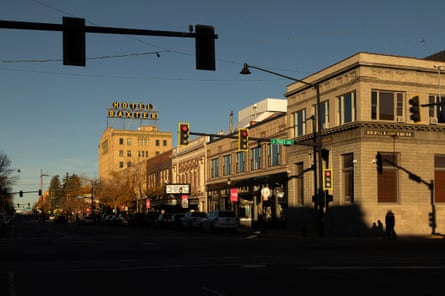
If Tester is defeated by his less experienced but Trump-friendly opponent, one more blue dot will be extinguished. It will be a fresh data point in the great sorting between blue states and red states, between urban liberals and rural conservatives, between so-called coastal elites and flyover states.
One factor in the polarisation is the decline of local newspapers and rise of talk radio and cable television, which offer national news through a partisan lens.
Ken Toole, 69, a Democrat who served in the Montana state senate, said he and his neighours agree on identifying problems such as taxes, the concentration of wealth and monopolies in the meatpacking industry. “But they just have absolutely no faith that Democrats can deal with that and we’re talking about people who are sitting in their tractor all day listening to talk radio.
“I work cattle with my neighbours and talk to them pretty regularly – it’s not like they’re foaming at the mouth. Over time, the brand of Democrats in areas like this has just been eroded. The difficult question for me is, how do you build it back?”

 German (DE)
German (DE)  English (US)
English (US)  Spanish (ES)
Spanish (ES)  French (FR)
French (FR)  Hindi (IN)
Hindi (IN)  Italian (IT)
Italian (IT)  Russian (RU)
Russian (RU)  5 hours ago
5 hours ago
























Comments